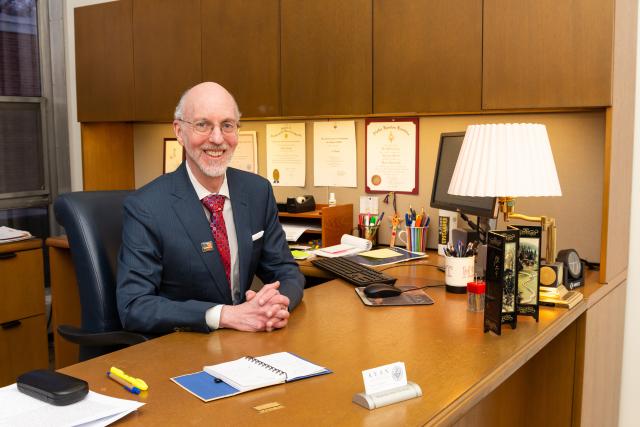Q&A: Science and Human Rights with Kean Provost Jeffrey H. Toney, Ph.D.

Kean University Provost and Vice President for Academic Affairs Jeffrey H. Toney, Ph.D., is committed to advancing the connection between science and human rights. A chemist by training, he advocates for academics in all fields to consider how their work impacts global issues. In recognition of his contributions to science and human rights, Toney recently attended the RFK Center for Human Rights Ripples of Hope Gala in New York, at which President Obama received the organization’s annual award.
Toney authored a chapter, entitled Chemists Contributing to Human Rights: Enhancing Research, Teaching and Global Impact, that was selected for inclusion in the prestigious American Chemical Society Symposium Series, to be published this spring by Oxford University Press. He sat down with Kean News in advance of Kean’s upcoming Human Rights Institute Conference to discuss human rights, science, and how the two fields can dovetail.
Why did you choose to write on this topic?
As I’ve learned more about the value of the Human Rights Institute on our campus, I have discovered that every field connects with human rights in some way. All academics by nature focus on one field; we tend to get more and more narrow in our focus. I think this topic allows us all to be more global in our thinking.
How will this book be used?
Oxford University only selects the American Chemical Society’s best to publish. This symposium series will be presented to the global science community. It will be used in classrooms globally, truly on every continent, as well as in research laboratories and companies. My hope is the whole discussion of human rights will get some attention.
What would you say is the overarching message of the chapter?
The most important message to me is that contributing to human rights does not have to be seen as something that’s political or something that’s additional work. The message I’m trying to get through is that as a chemist or scientist, you have an opportunity to contribute to important human rights issues. At Kean in particular, by adding a human rights perspective to your work, it makes you a better researcher, makes you a better teacher, and at the same time gives you some broader global impact.
Why is it important for chemists to integrate human rights perspectives into their research?
It makes it more relevant. It allows them to have broader impact in what they do. It gives them an opportunity to publish and establish a reputation outside of the area in which they have trained.
What are some specific ways that chemistry and chemical research can support human rights?
There are dozens of projects where chemists, scientists and engineers have done valuable work for specific causes, from water contamination, to food source contamination, to figuring out ways to make generic medications more affordable. In Flint, Michigan, where there were high levels of lead found in the water supply, chemists shone light on the whole issue. There were some individual chemists who heard through various networks that something was going on; they volunteered their time; and they were the people who uncovered the whole thing. Think of how many children’s development was affected.
Why should human rights be part of the teaching of chemistry?
The common question some students ask is, “Why do I need to learn this?” Especially in a place like Kean, where you have students coming from all different backgrounds, to be able to tie it back to something in their culture is very positive. I have had students from Bangladesh, and I can bring up an example like arsenic found in the groundwater in Bangladesh, where chemists performed testing that helped lead to clean drinking water. When you connect it to something students can relate to, it’s much more effective than just saying, “Let’s open our book to chapter eight.”
We live in a time where some scientific findings are questioned, and where there are fewer science journalists, than there once were, to get news out. Do chemists and scientists need to communicate directly with the public more?
Absolutely. It’s just so critical. We need bona fide trained scientists who can be their own writers. They can write blogs, letters to the editors or op-eds; or reach out to established podcasts. As a community, we must consistently and persistently share our opinions with the public whenever and wherever we can.
Do you have a message for Kean’s faculty?
It’s my hope is that more faculty will look at human rights as an example of something that a person with a science background - or any academic background - can do to broaden their work. All fields connect to human rights.
Hear more on science and human rights in an interview with Provost and Vice President for Academic Affairs Jeffrey H. Toney, Ph.D. on the Bayer Strategic Consulting podcast, When Science Speaks. | Listen